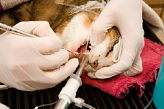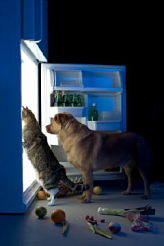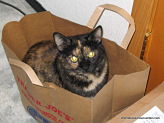Senior Cat Health
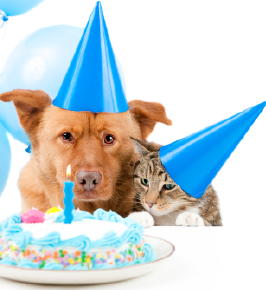
Senior cat health ...how to deal with elderly cat health problems and maintain good cat nutrition can be challenging. Caring for older cats includes nutrition and behaviors that will change but you want to make the most of your cat's later years.
Senior cat health has changed. The average cat's life span has increased. It is now 15 to 20 years and that's the longest its ever been in their evolutionary history. This is mainly because we shelter our pets from many potential risks like disease, fights and predators. Indoor cats tend to live the longest. They start to slow down and sleep more, they may stop habits like jumping in the plants and play less.
With senior cat health, felines are prone to common elderly cat health problems, including deteriorating eyesight and hearing, reduced strength and agility, constipation, tooth decay, loss of muscle strength, and stiffness. More serious illnesses can include cancer, heart disease, kidney disease and diabetes. Older cat health promotes prevention as the key for all of these, and many of these illnesses are treatable.
Yearly veterinary visits are always important for a cat of any age, but with senior cat health they are more critical. Many vets start screening for geriatric problems after nine years of age. The typical "geriatric profile" includes tests for thyroid hormone, blood sugar, potassium level, and kidney values (amount of waste products in the bloodstream).
A geriatric exam goes from nose to tail. Teeth are important because dental disease can lead to tooth infection which can create infection throughout the body. Ophthalmic exams look at the retinas in the eyes because a ruptured blood vessel in the retina can lead to retinal detachment and is an indicator of a sneaky disease called hypertension or high blood pressure. When caught early, medication can lower the blood pressure.
The vet will palpate the neck for enlarged thyroid glands which indicates an overactive thyroid. The heart is checked for murmurs, elevated rate and abnormal rhythms. The vet also palpates the abdomen to check for swelling of the liver, evaluates the size and shape of the kidneys and checks for abdominal masses, colon masses and constipation.
The key to keeping senior cat health in a good zone is paying attention to any changes in her appearance or behavior. Cats tend to be subtle when it comes to showing they're sick, because in the wild, to show weakness is to invite an attack. One of the most common signs of feline aging is a change in body weight.
They tend to lose weight rather than gain it, because the body can't absorb nutrients as effectively. You should weigh your older cat every month to catch problems early. If you notice your cat isn't eating as much, it's time for a vet visit. Appetite loss is not necessarily normal for an aging cat and can indicate a medical problem.
If you cat is drinking more than usual it can be a sign of diabetes in cats, feline hyperthyroidism, or feline kidney disease. As your cat ages they have a tendency to eliminate potassium in their urine, which can create muscle problems, which in turn can affect the heart and mobility. If this is the case your cat can be given potassium supplements in pill form to help the senior cat health situation.
There are a number of things you can do to keep your senior cat health humming along. Groom your cat daily. Her skin glands produce less oil than they did before and stiff joints may make her less likely to groom herself. Grooming also helps increase blood circulation in the skin. Have your vet check that this is not a sign of sickness. Senior cat health also covers dental problems.
Brush your older cat's teeth daily see cat teeth. If you notice your elderly cat is having difficulty chewing, eats less, can't hold food in her mouth while eating, has bleeding gums, bad breath, or loose teeth, this can indicate gum disease, a mouth tumor or broken or diseased teeth. Take your cat to the vet.
Cancer can cause loss of appetite, and if your cat has painful dental problems it may be less inclined to eat. Weight loss or eating a lot with no weight gain, can be a symptom of feline hyperthyroidism (a benign growth in the thyroid gland), early diabetes in cats, or parasites. If the cat isn't sick, see if she'll eat more food. Fat and protein are the nutrients that are impacted the most. A normal adult cat eating 10 grams of fat will only absorb 8 of the 10 grams as she ages...that's 20 percent less. So if the cat will eat 12 grams of fat a day, it can absorb 10 grams and get the daily requirement.
Feeding smaller meals more often works pretty good. Lots of commercial companies make senior cat diets for senior cat health and some tend to be softer in content because older cats often have had some tooth loss. If you can provide vitamins and mineral supplements to your cat's food that will also help.
Massaging your cat can be relaxing, it helps loosen up stiff joints, and improves blood circulation. Older cats can also have problems getting to the litter box. They may become too weak, or have too much pain to walk all the way to the box, and they may not be able to control their bodily functions as well as before. Cat diapers are now readily available.
Providing boxes in rooms where your cat typically has accidents can help. Arthritis can make it difficult for cats to jump over the side of the box and this can be solved by cutting an opening in the side of the box, leaving a couple of inches on the bottom to keep the litter in. If you see your cat squatting to urinate, and then gradually raise her rear, this can be an indication of arthritic hips. Cover the walls around the box with newspaper to protect from stray droplets.
Elderly cat health problems and changes occur in the cat's brain. Messages traveling along the nervous system slow to a fifth of their previous speed. Blood vessels in the brain lose their elasticity and the surrounding membrane becomes hard and brittle.
Because the lungs are less efficient, the brain doesn't receive as much oxygen as it did before and this affects memory and learning. Tiny hemorrhages may occur in the brain tissue and the brain actually shrinks 25 percent.
These changes can affect your cat's personality. Your cat may experience small strokes and even a kind of senile dementia similar to Alzheimer's Disease, which will make your cat get more irritable when disturbed, hiss and spit more often, and/or be disoriented at times. Older cats have more trouble turning off their stress responses. Even when relaxed, they secrete more stress-related hormones.
Another common symptom in senior cats is increased vocalization. This can indicate hyperthyroidism, which sometimes makes them anxious. Dementia can make them confused. Our older cat Tart, when she was around 18 years old, would holler and call for us because she couldn't remember where we were if we were not in sight. Many of these situations, even dementia, can be helped considerably by using medication.
Often that puts them back into a normal behavior mode. It is important to note that you shouldn't dismiss changes in behavior as simply due to aging, they may indicate a medical problem. For example, a cat who starts getting temperamental and hissing can have a bad tooth that is causing a lot of discomfort and that's the reason for the aggression.
Senior cat health also means giving your cat plenty of love and attention which can help mitigate some of the effects of aging. Don't stop playing with your cat just because she's old. Mental stimulation is even more important at this time.
It may not be as easy to interest an older cat as a kitten, but it's worth the trouble. Without mental stimulation, senior cat health wanes and older cats may become more lethargic, and studies have shown that regular play can help a cat's brain to grow more connections between cells.
Senior cat health is different because of the changes in the brain and the overactive stress hormones. It's a good idea to keep your cat's life as simple and stress-free as possible. Cats normally hate changes in routines and environment so older cats hate it even more. Although you are giving your older cat attention, pick her up gently.
Older cats can have arthritic changes in the spine and if you bend them too much you cause discomfort. I picked up my older cats by putting one hand under their shoulders and the other hand under the rear end to support it so the rear feet didn't dangle too much.
Cats who are so close to the end of their lifespan makes for some difficult decision-making. You have to decide when your beloved cat's quality of life has diminished considerably. You have to weigh out which is in the animal's best interests, not your own. Euthanasia is always a difficult decision and I've had to make that decision for Tart (21 years), Bandita (9years but with cancer), Diablo (15 years), and Tuffy (21 years).
I know I will face it with my current six cats and it doesn't get any easier. Until that time, give them someplace warm and comfortable, and give them love and kindness. Geriatric cats can't do things the way they used to, can't jump up on things, can't see as well as they used to, so be there to give a helping hand.
Tart at about 20 years old, missing some teeth (seen below)
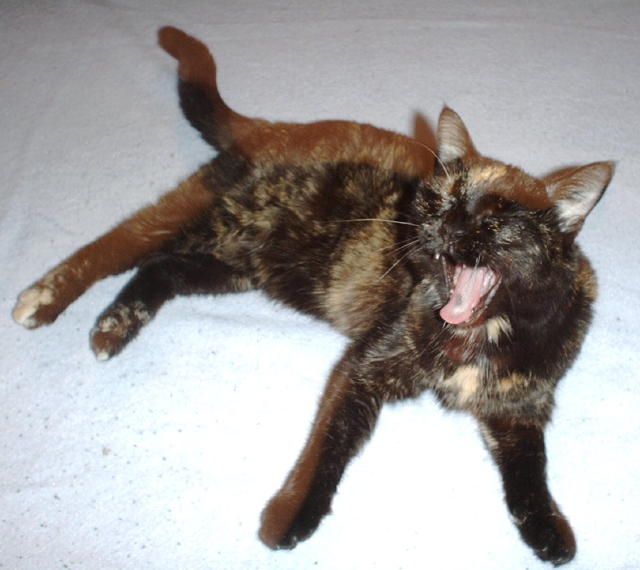
Related Articles......
Return from Senior Cat Health to Cat Health Homepage
Having trouble finding what you need? Cat Health Index & Site Map
OR
Do you have a question to ask?...Questions
OR
Do you have a cat story to share?...Simply click here to go to that page!
Copyright@2010-2020 All rights reserved.Cat-health-detective.com
This website is information only. Consult a veterinarian for medical assistance
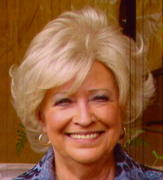
"Like Us" on Facebook
or...
"Like Us" here

